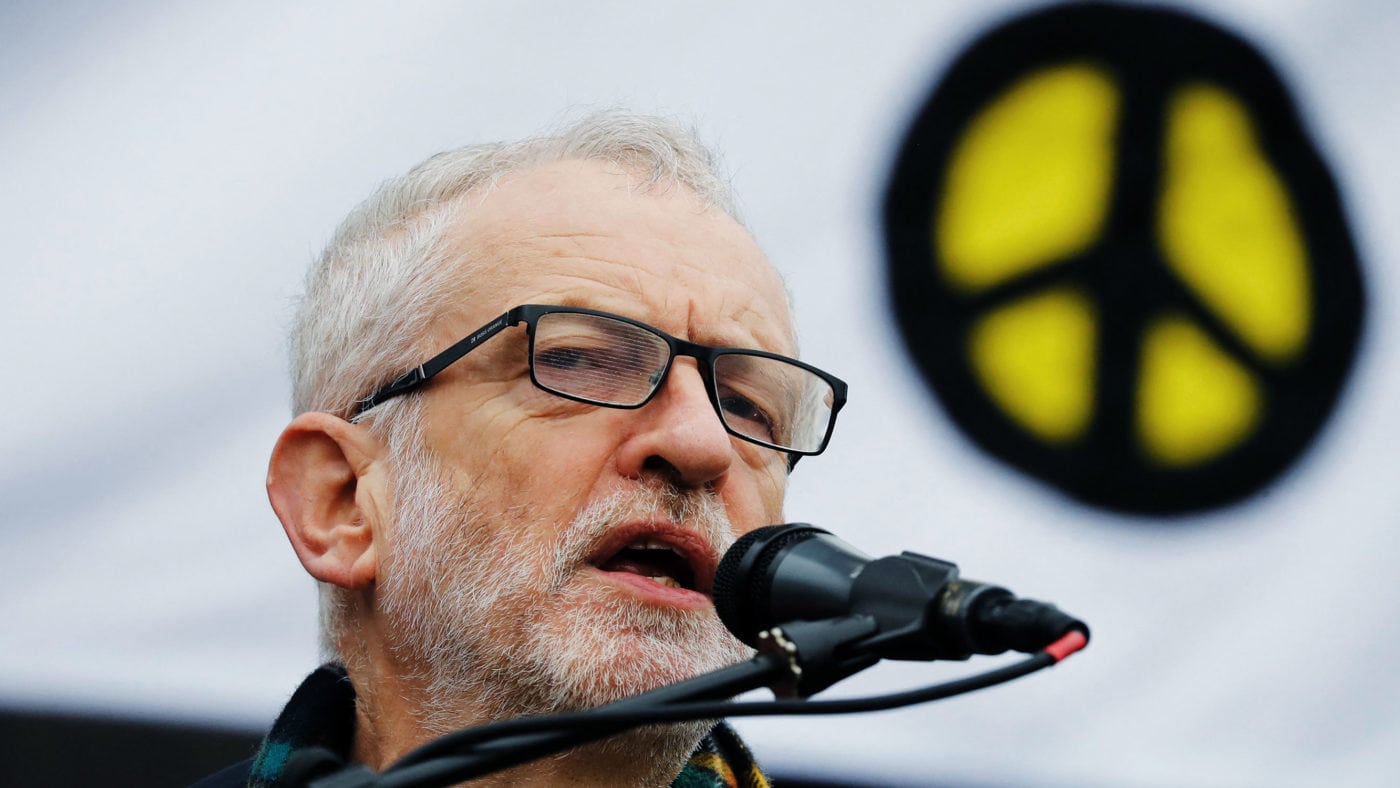I doubt many will disagree that this is not a Golden Age of politicians. The Prime Minister has been forced from office over his behaviour, the campaign to replace him has been far from inspirational, and the opposition is led by a man who was not inaccurately described by the outgoing PM as ‘Captain Crasharoony Snoozefest’.
But I am not here to plunge you into doom by reminding you of how bad things are. The opposite, in fact. I want to remind you of how much worse things could have been, prompted by an interview with Jeremy Corbyn published yesterday.
Since resigning as Labour leader, Corbyn seems to have been on a mission to remind people of the bullet we dodged. Labour may have suffered its worst defeat since the 1930s under him in 2019, but two years before that he came frighteningly close to power.
Corbyn has been speaking to Al-Mayadeen, which describes itself as an ‘Arab Independent Media Satellite Channel’. In reality, it is an Iranian propaganda vehicle, a Hezbollah-supporting station which also backs the Assad regime. Not that anyone should be surprised Corbyn chose such a channel to offer his thoughts; he has in the past been paid £20,000 by Press TV to appear on the Iranian propaganda station.
This support for Iran has been a consistent thread in Corbyn’s career. In 2014, the year before he was elected Labour leader, he was at a celebration of the 35th anniversary of the ayatollahs seizing power in Iran. Corbyn spoke on ‘the case for Iran, alongside the British representative of the Mahdi Army militia, a group which between 2004 and 2008 killed at least 70 British soldiers in Iraq. And in November 2012 he hosted a meeting in Parliament with Mousa Abu Maria, a member of the banned terrorist group Palestinian Islamic Jihad, which was funded by Iran.
During his leadership of the Labour Party there was a ridiculous row over allegations that he was some sort of Russian agent. It was a stupid allegation to make, without a shred of evidence supporting it. But it was all the more stupid because if Corbyn had been a Russian agent he would surely not have been so obviously and publicly supportive of Russia in his statements and actions. Rather, he was the embodiment of what Lenin called the ‘useful idiot’ – a man who did the Kremlin’s work for it without realising that he was doing so. We all remember his response to the poisoning of Sergei and Yulia Skripal, Nick Bailey and Dawn Sturgess, when he refused to criticise Russia and demanded that Putin be sent the evidence to test for himself.
In his latest remarks on Al-Mayadeen, he effectively calls for the Russian invasion of Ukraine to be accepted, attacking what he calls the West’s ‘pouring arms in’ to help Ukraine resist. Arming Ukraine will not ‘bring about a solution. It’s only going to prolong and exaggerate this war’. That’s exactly the line one would expect from the deputy president (and former chair) of Stop The War – an organisation set up to support the enemies of the West.
Corbyn repeatedly uses the word ‘peace’ in the interview – as he has done all his life. But his definition is very different from the mainstream. Take his words yesterday: ‘Hardly any of the world’s leaders use the word peace. They all use the language of more war and more bellicose war…Putting more and more arms into Ukraine isn’t going to bring about it [peace]’.
To Corbyn, ‘peace’ requires that when an enemy of democracy invades a democratic country sympathetic to the West, that nation must submit to the invasion because to fight an enemy of the West is, by definition, wrong. My enemy’s enemy, and all that. As he puts it in the interview: ‘There has to be a peace, otherwise what are we looking at?’. Peace, in this definition, means a cease fire and agreement to end resistance to Russia – which means Ukraine must accept its annexation to achieve ‘peace’.
It’s an accident of timing that Corbyn’s latest interview is doing the rounds at the same time as President Biden confirmed last night that a US drone strike in Afghanistan had killed Ayman al-Zawahri, who took over from Osama bin Laden as al-Qaeda leader after the latter was killed by the US.
In that context, it’s worth reminding ourselves of Corbyn’s first set-piece interview of the 2017 election campaign, in which Andrew Marr asked the then Labour leader what he would do if offered the chance to take out the leader of Islamic State. Corbyn replied, dismissively, that he would reply: ‘Tell me what you think can be achieved by this…Does this help to get a political solution in Syria?’. He went on to demand that the US stop air strikes against al-Assad, showing that he would not so much be a danger to national security as the end of it.
There is, of course, so much else (I’ve not even mentioned antisemitism under his Labour leadership). It’s all variations on the same theme – that Corbyn is an extremist who has spent over 30 years demonstrating it.
Now that the threat of his taking power is over, it’s salutary to think how close he came – and to remind ourselves that for all the work Sir Keir Starmer has done to change Labour’s image, it was only three and a half years ago that he was trying to persuade the public to make Corbyn PM.
Click here to subscribe to our daily briefing – the best pieces from CapX and across the web.
CapX depends on the generosity of its readers. If you value what we do, please consider making a donation.


